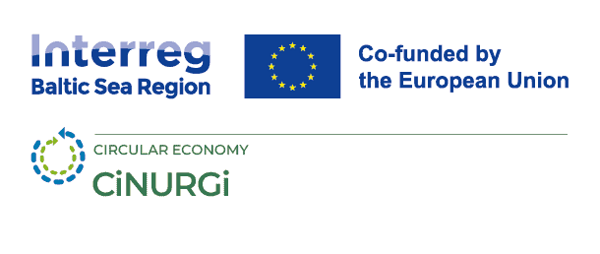The Association of Municipalities of Tartu County is a partner in Interreg Baltic Sea Region programme project "CiNURGi", focused on the development of a circular economy of nutrients in the Baltic Sea region.
Objective: Upgrading current infrastructure and technology to enhance nutrient recovery from biomass and other agricultural, municipal, and industrial resources. The project aims to promote efficient nutrient cycling and increase the use of recycled fertilizer products.
Target groups: local municipalities, bioeconomy companies.
Beneficiaries: companies of various sizes, residents of the Baltic Sea region.
Project implementation period: November 2023 - October 2026.
Project budget: 6.54 million euros, ERDF co-financing 5.23 million euros.
Partners: The project involves 24 partners from eight Baltic countries: RISE - Research Institutes of Sweden (Sweden), HELCOM (Finland), Natural Resources Institute Finland - Luke (Finland), Julius-Kühn-Institute - Federal Research Center for Cultivated Plants (Germany), VA SYD (Sweden), The Institute of Fluid-Flow Machinery Polish Academy of Sciences (Sweden), Rural Knowledge Center (Estonia), Centrum Balticum Foundation (Finland), Swedish University of Agricultural Sciences (Sweden), Farmers' Parliament - ZSA (Latvia) , Institute of Soil Science and Plant Cultivation (Poland), SF-Soepenberg GmbH (Germany), Organa Institute ApS (Denmark), Skive Municipality (Denmark), Peab bostad AB (Sweden), Finnish Biocycle and Biogas Association (Finland), Green Circle LT (Lithuania), Linnaeus University (Sweden), The Rural Economy and Agricultural Society (Sweden), More Biogas Drift Småland AB (Sweden), Kuljetus Tero Liukas Oy (Finland), Municipal Waste Management Plant Sp. z o. o. in Olsztyn (Poland), RENDBEN Limited Liability Company (Poland).
In Estonia, some of the project activities are carried out in Tartu County.
Circular economy is an economic model that prioritizes the sustainable use of resources, based on the principle that everything that is taken from nature must remain in use for as long as possible. The purpose of the circular economy is to decouple economic growth creating a production and consumption system with as little losses as possible from the use of primary raw materials (definition from the website of the Ministry of Climate).
Among the key activities of the project are:
- Development of standards for safe and sustainable recycling of nutrients
- Development of nutrient recycling strategies to improve the regional nutrient balance
- Wider acceptance and promotion of the use of recycled nutrients
- Exploring business opportunities for nutrient recycling
- Increasing political awareness of the importance of nutrient recycling in the Baltic Sea region.
The expected results of the project are:
- Increased efficiency in areas of nutrient use
- Supporting climate-neutral food production
- Reduction of nutrient pollution in the Baltic Sea
- Improved economic opportunities for nutrient recycling in industry

-1.png)